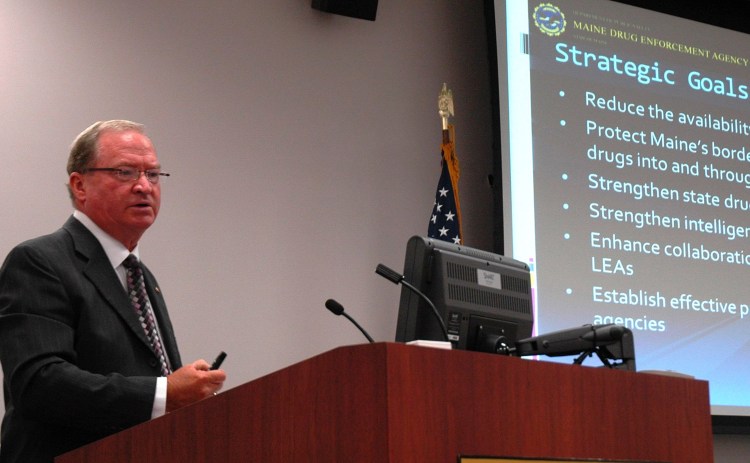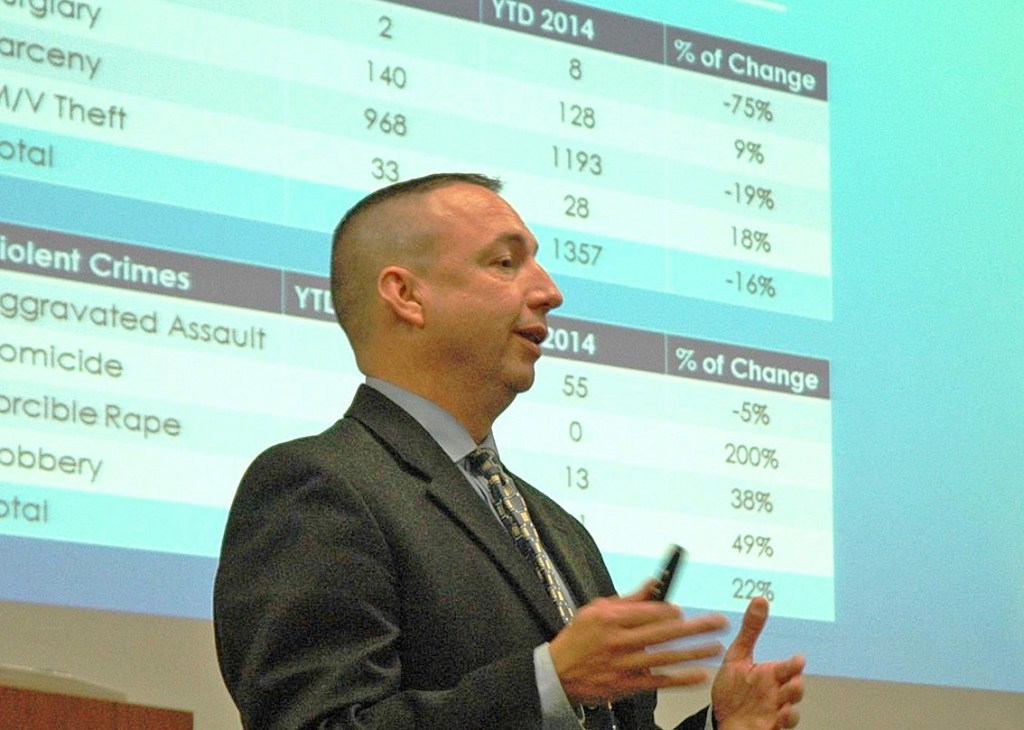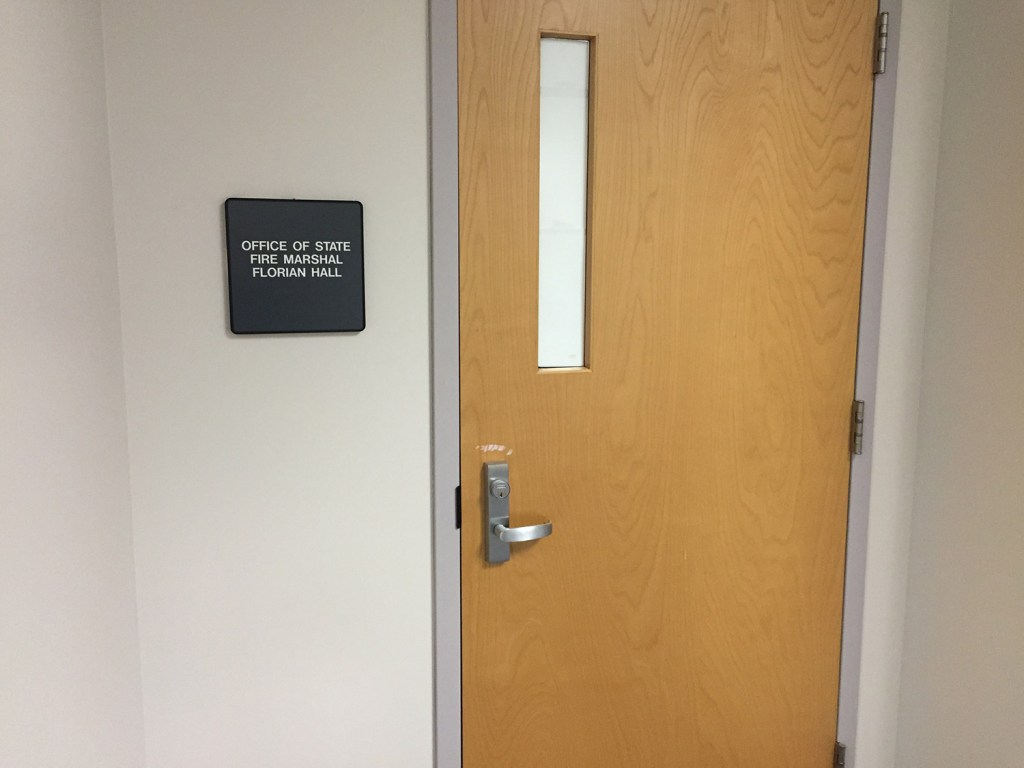AUGUSTA — After a closed-door meeting Wednesday convened to address the state’s heroin epidemic, Gov. Paul LePage’s public safety commissioner said that Maine will use the state police intelligence center and additional resources from the National Guard to combat drug trafficking.
Public Safety Commissioner John Morris discussed the stepped-up efforts after a three-hour meeting organized by LePage that involved the state’s top law enforcement officials and others fighting the heroin epidemic.
The meeting was closed to the public and the media. Even the window of the door to the conference room was papered over to prevent people from observing. Afterward, however, Morris and other participants answered questions, and officials said no confidential information was discussed.
Adrienne Bennett, the governor’s spokeswoman, said the meeting was made private at the request of several attendees, but she would not specify who or why the request was made. Several of the participants said no law enforcement tactical information was discussed during the meeting and that they were free to discuss all facets of the meeting after it ended.
LePage attended the event but left the summit without taking questions from reporters. Bennett said LePage didn’t want to “politicize” the event.
Morris said the National Guard will not act in a law enforcement capacity “at this time,” but will assist local law enforcement and emergency responders to gather information and provide analysis as part of a coordinated effort to break the supply of heroin coming into Maine. The National Guard already acts in a support capacity with the Maine Drug Enforcement Agency, providing four members to do analysis. Morris would not specify how many additional Guard members will be used or what type of information they provide to MDEA.
“The drug issue is huge and anybody that doesn’t recognize that has their head in the sand,” Morris said.
ENFORCEMENT, TREATMENT, EDUCATION
Morris and the LePage administration billed the meeting as a focus on enforcement, while acknowledging that treatment and prevention also are part of the equation. However, several participants in the summit stressed the treatment and prevention components after the meeting, including U.S. Attorney for Maine Thomas Delahanty, who handles the prosecution of drug cases that violate federal law.
“There needs to be an effort on education and prevention … and there needs to be positive steps on the treatment side as well,” Delahanty said. “It needs to be coordinated.”
The meeting at the state Department of Public Safety took place a day after U.S. Sen. Angus King, a Maine independent, hosted a forum in Brewer that included family members of those who have died from drug overdoses, along with treatment providers, law enforcement and Michael Botticelli, the Obama administration’s director of the Office of Drug Control Policy. The two meetings reflected contrasting approaches to the heroin and opioid crisis that has led to the deaths of 34 people this year, according to the Maine Office of Attorney General, a toll that is on pace to match or exceed the 57 people who died of heroin overdoses last year. The meetings also followed 14 overdoses in Portland over a 24-hour period, resulting in two deaths, during the first weekend in August.
LePage has said the crisis calls for a law enforcement-heavy approach to disrupt the criminal network piping cheap heroin and other drugs into the state. His strategy has been criticized by treatment providers and civil libertarians who question the state’s commitment to treatment funding and whether increased arrests will sweep up and incarcerate users as well as traffickers.
Michael Ferguson, special agent in charge of the Drug Enforcement Administration in New England, attended the summit and said his agency wasn’t focused on “the heroin addict.”
“We are targeting drug-trafficking organizations, those responsible for putting the poison out on the street, whether it’s heroin or heroin laced with fentanyl, that’s killing the citizens of Maine and others in the United States,” he said.
Ferguson stressed that the heroin epidemic was not unique to Maine. He described the heroin trade as largely originating in Mexico, where poppy production has increased by 50 percent. From there, the drug spreads throughout the country through a web of traffickers in Maine and other states.
“Mexico traffickers coordinate with Maine homegrown organizations,” he said. “There’s Maine traffickers who go to Massachusetts and north of Boston and obtain heroin and bring it back to Maine. You also have opportunistic drug traffickers in New York and Connecticut that are sometimes affiliated with gangs who also come to Maine and distribute the drugs.”
ROLES OF GUARD, INTELLIGENCE CENTER
Participants described the summit as a brainstorming session that will eventually lead to a coordinated three-pronged plan that includes enforcement, treatment and prevention. Delahanty said he expected three separate working groups would meet and later provide an integrated approach.
“This is not an overnight solution. They really need to be taken together,” he said.
Morris, the public safety commissioner, stressed the increased role of the Maine Information and Analysis Center and the National Guard. He offered few specifics on the Guard’s role, but the intelligence center will create a separate division to deal with the drug trade. The center is largely an intelligence agency that collaborates with federal, state and local enforcement to gather and disseminate data that can be used in disrupting criminal networks.
Morris said emergency responders and emergency rooms will join law enforcement to provide information to the intelligence center about overdoses and arrests. He described the Guard as providing additional analytical support, without saying how the military branch gathers information or what support it will provide.
Roy McKinney, director of the Maine Drug Enforcement Agency, said the goal of using emergency responder and emergency room data wasn’t to target addicts, but to analyze “hot spots” across the state.
McKinney said the National Guard already is coordinating with the MDEA and he didn’t know how many additional guardsmen would be assigned to his agency to help gather intelligence. Guard analysts support MDEA and law enforcement by shouldering more of the data and intelligence efforts so that law enforcement can conduct investigations and make arrests, he said.
Despite Morris’ comments that the National Guard might one day provide an enforcement role, it doesn’t have the authority to enforce domestic laws.
It can provide support, however, and states have used Guard resources for drug-interdiction efforts, such as flights to search for marijuana crops, but it’s less common for states to enlist Guard units in anti-heroin efforts. In Atlanta this month, the Georgia National Guard was called in to demolish blighted houses that had been used by heroin dealers.
Although law enforcement officials outnumbered treatment experts by more than 3-to-1 at the summit, Maine Attorney General Janet Mills, a Democrat, said the conference was a relatively balanced discussion of treatment, prevention and enforcement. She said treatment experts made their voices heard at the meeting despite LePage officials’ focus on enforcement.
SHRINKING DRUG TREATMENT SYSTEM
The LePage administration has been strongly criticized for not supporting more treatment capacity for addicts. On Monday, officials from Spectrum Health Systems said they are shuttering their Sanford outpatient addiction-treatment facility because of a lack of state support.
“In Massachusetts, we’re seeing law enforcement helping addicts get into treatment,” said Charles Faris, Spectrum’s president and CEO. “In Maine, Gov. LePage is discussing calling in the National Guard to combat the state’s drug epidemic while leaving multimillion-dollar grant opportunities for funding treatment on the table.”
Rep. Mark Dion and Sen. Anne Haskell, both Portland Democrats, said the Legislature is ready to assist the LePage administration in combating the drug crisis. However, Haskell said, the governor needs to recognize that the epidemic is also a public health crisis and that some seeking treatment can’t get it.
“It makes for great TV to arrest a drug lord,” Haskell said. “But it’s not such great TV to show someone coming out of treatment.”
Dion, the former Cumberland County sheriff, said, “I appreciate what was said in (the media briefing), that this is not a war. … How we ever thought that the rank-and-file police were able to solve what is primarily a public health issue is where we misplaced our priorities and money. We need to re-balance that formula.
“The day that we can say that addiction and drug abuse is first and foremost a medical issue is when we’ll have turned the corner in this fight.”
Send questions/comments to the editors.





Comments are no longer available on this story